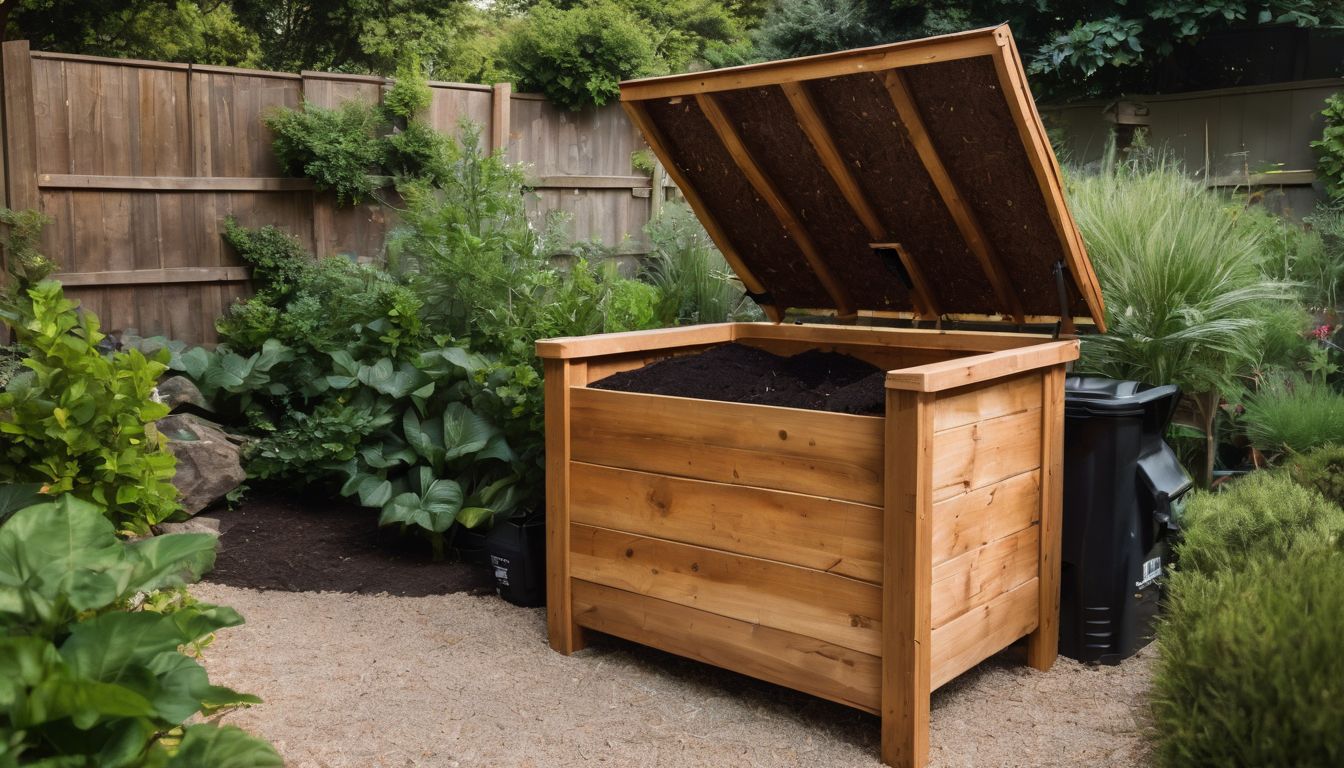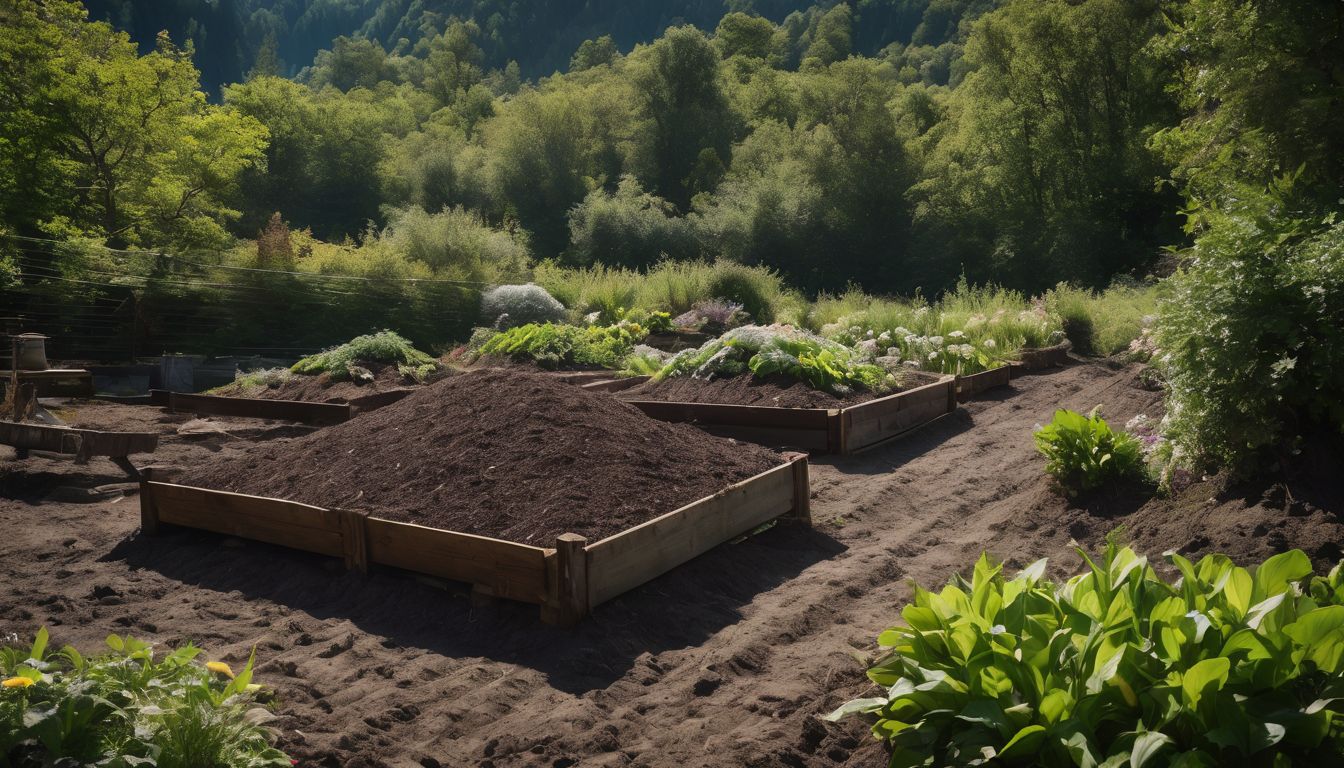Having a thriving garden often means ensuring the soil is full of life. Compost introduces vital microorganisms that are essential for healthy soil. This article will reveal how composting can boost your garden’s ecosystem, directly benefiting plant growth and vigour.
Dive in to unearth these secrets!
Key Takeaways
- Compost heaps are alive with microorganisms that play essential roles at each stage of decomposition, breaking down waste into nutrient-rich soil.
- The variety and succession of microbes in compost depend on factors such as temperature, moisture, and the type of organic materials present.
- Using compost improves soil health by boosting microbial diversity, promoting efficient nutrient recycling and helping plants access the nutrition they need for growth.
- Soil enzymes increased by composting lead to a more effective breakdown of matter within the soil, further enriching it with vital nutrients.
- Stabilised soil from consistent composting prevents erosion and holds water better, making it an ideal environment for healthy plant roots.
The Role of Compost in the Composting Process
Compost plays a crucial role in the composting process by providing the necessary organic matter for microbial activity. This leads to the breakdown of plant biomass and other organic waste, creating an ideal environment for soil microorganisms to thrive.
The Phases of Composting
Composting transforms organic waste into rich soil fertiliser. It’s a vital process for enhancing soil fertility and supporting plant growth.
- The initial phase of composting is the Mesophilic stage. Here, small organisms break down easy-to-digest sugars and starches, rapidly increasing the pile’s temperature.
- Thermophilic bacteria take over in the second phase. They thrive in the heat, decomposing tougher materials like proteins and fats, and eliminating pathogens and seeds.
- Following this intense activity, the compost pile starts cooling down. This marks the beginning of the Cooling phase where fungi and macro-organisms become more active, further breaking down organic matter.
- Finally, we reach the Maturation stage. Microbial activity slows as compost stabilises and matures, forming humus which is teeming with microbial life ready to enrich soil ecology when applied to gardens or fields.
Compost Pile Microbes
Compost pile microbes break down organic materials during the composting process. These tiny organisms, including bacteria and fungi, work to decompose waste into nutrient-rich compost.
As they digest organic matter, they release enzymes that further break down materials into simpler forms.
The activity of these microbes helps in creating a fertile environment for plant growth and enriches the soil with essential nutrients. Compost pile microbes play a vital role in promoting healthy soil by facilitating efficient decomposition and nutrient recycling processes.
The Compost Food Web
The compost food web consists of a diverse array of organisms that work together to break down organic matter in the compost pile. Bacteria, fungi, nematodes, and arthropods all play crucial roles in the decomposition process.
These microorganisms are responsible for breaking down complex organic materials into simpler compounds, making nutrients more accessible to plants and other soil organisms. As part of this intricate web, they contribute to the nutrient cycling process by transforming nutrients from one form to another.
Moreover, these microorganisms help maintain balance in the compost pile by controlling populations of potential pathogens and preventing harmful substances from accumulating. The interactions within the compost food web are essential for efficient decomposition and result in high-quality compost that can be used as a valuable soil amendment for promoting healthy plant growth and enhancing soil fertility.
How Composting Affects Soil Microorganisms
Composting promotes the development of diverse microbial communities in soil, improving soil health and fertility. Factors such as feedstock type, temperature, and oxygen levels can impact the succession of microbial populations during composting.
Promotion of Microbial Communities
Promotion of microbial communities in composting is vital to the breakdown of organic matter. Microbes such as bacteria and fungi thrive during the initial stages of composting, breaking down complex materials into simpler forms.
As the process progresses, these microbes attract other species, contributing to a diverse and robust ecosystem within the compost pile. This diversity fosters efficient decomposition, leading to nutrient-rich soil amendments that benefit plant growth and soil health.
The promotion of microbial communities in composting not only accelerates organic waste decomposition but also enhances soil fertility by enriching it with beneficial microorganisms.
These microbes facilitate biodegradation activities in the compost material, effectively converting it into valuable humus which can be applied to improve soil structure and function.
Factors That Affect Microbial Succession
Microbial succession in composting is influenced by various factors. Environmental conditions such as temperature, moisture, and oxygen levels play a crucial role in determining the types of microbial communities that thrive during different composting phases.
Additionally, the composition of organic materials in the compost pile significantly impacts microbial succession. The availability of nutrients and carbon sources can influence which microorganisms dominate at different stages of decomposition.
Furthermore, the management practices applied to the compost pile also affect microbial succession. Factors like turning frequency, particle size, and aeration techniques can impact microbial diversity and activity.
The Positive Impact of Composting on Soil Biota
Composting positively impacts soil biota by improving soil microorganisms, enhancing soil enzymes, and stabilising soil properties. These improvements contribute to the overall health and fertility of the soil.
Improved Soil Microorganisms
Composting enriches soil with beneficial microorganisms, such as bacteria and fungi, which help in nutrient recycling and disease suppression. These microbial communities play a crucial role in breaking down organic matter, releasing essential nutrients to support plant growth.
By enhancing the diversity and abundance of soil microbes, composting improves soil fertility and overall ecosystem health. This process helps maintain a balanced soil food web, promoting sustainable agriculture and reducing the need for chemical fertilisers.
With improved soil microorganisms resulting from compost application, the activity of beneficial microbes increases, leading to enhanced decomposition of organic matter. This boosts nutrient availability for plants and supports their growth while also contributing to a more resilient ecosystem.
Enhanced Soil Enzymes
Enhanced soil enzymes play a crucial role in breaking down organic matter and making nutrients more accessible to plants. Compost application increases the activity of soil enzymes, leading to improved nutrient cycling and availability.
This not only supports healthier plant growth but also contributes to overall soil health and fertility, promoting sustainable agricultural practices.
Stabilising Soil Properties
Stabilising soil properties through composting involves enhancing the structure, porosity, and water-holding capacity of the soil. Compost can bind soil particles together, reducing erosion and improving overall stability.
This process also helps to maintain optimal pH levels in the soil, creating a favourable environment for microbial activity and nutrient uptake by plants.
Composting contributes to the stabilisation of soil properties by increasing organic matter content, which enriches the soil with essential nutrients. This enhances root development and improves plant resilience to environmental stressors.
Understanding the Relationship Between Composting and Soil Microorganisms
Microbiological processes in composting play a crucial role in promoting soil nutrient recycling and enhancing soil fertility, ultimately benefiting plant growth. Learn more about the intricate relationship between composting and soil microorganisms by reading the full blog.
Microbiological Processes in Composting
During composting, a diverse array of microorganisms come into play. Bacteria and fungi break down organic matter to produce heat and carbon dioxide, initiating the decomposition process.
This phase is followed by the involvement of thermophilic bacteria, which thrive under high temperatures and convert complex compounds such as cellulose into simpler substances. As these microbes consume nutrients from the compost pile, they contribute to the transformation of materials into stable humus.
Additionally, actinomycetes further degrade organic matter with their enzymatic activity while also suppressing harmful pathogens through antibiotic production.
Soil Nutrient Recycling
Transitioning from the microbiological processes in composting, the process of soil nutrient recycling is a crucial part of the relationship between composting and soil microorganisms.
The breakdown of organic matter during composting leads to the release of nutrients such as nitrogen, phosphorus, and potassium into the final product. When this mature compost is added to soil, it enriches and revitalises it by providing essential nutrients for plant growth.
Soil microorganisms play a vital role in decomposing this organic matter further, releasing even more nutrients into the soil that plants can then absorb for their growth and development.
This cycle of breaking down organic matter through composting and utilising its rich nutrient content results in improved soil fertility, increased microbial diversity, and enhanced plant growth promotion.
Conclusion
In summary, composting plays a crucial role in fostering a healthy environment for soil microorganisms. Soil microbial communities thrive and multiply when exposed to the nutrients and organic matter found in compost.
As a result, the increased microbial activity in composting contributes to improved soil fertility and enhanced diversity of soil microbial communities. Ultimately, this relationship between composting and soil microorganisms highlights the significant impact that simple actions like composting can have on supporting conservation efforts and environmental sustainability.
FAQs
1. What is the link between composting and soil microorganisms?
Composting boosts the microbial activity in the soil, which helps create a rich microbial community that improves soil fertility.
2. How do microorganisms benefit from compost fertilisation?
Compost fertilisation provides essential nutrients that support soil microbial communities, increasing their diversity and contribution to healthy soil.
3. Can composting change the variety of microbes in the soil?
Yes, adding compost can enhance soil microbial diversity by introducing new beneficial microorganisms from decomposed organic matter.
4. Why are microorganisms important for composting?
Soil microorganisms play a crucial role in breaking down organic material during the composting process, turning waste into valuable fertiliser for plants.





